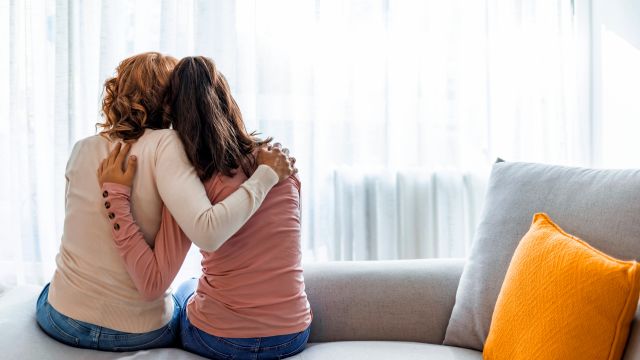Updated on May 27, 2024
Sharing a diagnosis of breast cancer with anyone can be difficult. Sharing a diagnosis with a child or teen often includes additional considerations. If you are living with breast cancer and are in the process of telling others about your diagnosis, the following strategies may be helpful when talking to the young people among your family and friends.
Prepare for the conversation
It’s a good idea to go into any conversation about a cancer diagnosis prepared. This means choosing the time and place, knowing what you want and need to discuss, and deciding the words that you will use.
Where do you want to have the conversation?
When sharing a cancer diagnosis with a child or teen, you will want to choose a place where there will be minimal distractions and interruptions. You will also want to set aside enough time for your conversation, including time for a child or teen to ask questions and express their feelings. Also remember to choose a time and place where you feel comfortable.
How do you begin the conversation?
The American Cancer Society has these recommendations when discussing a cancer diagnosis with children and teens:
- Start with questions. In many cases a child or teen may have already noticed that something is different. Start by asking what they know, if they have overheard anything, or if they suspect that something is wrong.
- Ask what they know about cancer. Different people learn about cancer at different points in their life. Ask what a child or teen knows about cancer already.
- Trust yourself. How you disclose a diagnosis will depend on who you are talking to, including their age, personality, and your relationship. It can be a bit different for everyone.
- Be honest. Withholding information can lead to mistrust and additional distress for both you and the child or teen.
- Explain that cancer is a serious illness. It’s important to convey the seriousness of cancer. Discussing topics like serious illness and death can be uncomfortable, but can be an important piece of information to share.
What do you want and need to share?
Conversations about cancer with kids and teens require balancing too much information with too little information, and it can help to practice what you want to say with an adult beforehand. Here are some basics to cover:
- Explain what breast cancer is and how it affects a person’s health. For children, emphasize that it is not contagious and that it is no one’s fault.
- Explain how breast cancer is treated, and how side effects from treatment can cause physical changes, like weight loss and fatigue.
- Encourage them to express their feelings and ask questions.
- Explain how breast cancer and treatment will affect your lives.
Figuring out what words and explanations to use can be challenging. Remember that there are people who can help you. Ask your healthcare providers if they have material you can read. Talk to an oncology social worker. Connect with other people who have breast cancer through a support group (either online or in person) and ask how others have navigated these conversations. There are also support groups for kids and family members who have a loved one with cancer.
How will you respond?
Learning you have cancer is an emotional experience. Sharing your diagnosis is also an emotional experience. Preparation can help you anticipate how you will feel when sharing a breast cancer diagnosis and answering questions.
Talking to children outside your immediate family
Many people diagnosed with breast cancer will need to discuss their diagnosis with their own children. Many will also need to discuss the diagnosis with nieces, nephews, grandchildren, or the children of close family friends. If you will be telling a child outside of the immediate family about a cancer diagnosis, always begin by talking to that child’s parents or guardians.






